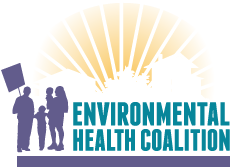The San Diego Association of Governments (SANDAG) is the metropolitan planning organization for the 18 cities in San Diego County and the county government. The SANDAG Board is made up of mayors, city council members, and county supervisors. SANDAG makes strategic plans and provides information on a broad range of topics pertinent to the region's quality of life.
SANDAG has developed a number of plans and strategies that relate to Climate Change, including the 2009 Regional Energy Strategy, the 2010 Climate Action Strategy and the Regional Transportation Plan.
The Regional Transportation Plan lays out what transportation options will look like in the San Diego Region from now until 2050. Approximately, $200 billion of transportation investments are projected to take place from 2011 to 2050. Every time you purchase a non-food item at the store, a certain percentage of the taxes you see on your receipt go to fund local transportation projects. This sales tax is called TransNet.
EHC opposes the plan that is moving forward. The plan invests heavily in freeway expansion projects, postponing many transit projects to the later phases of the plan.
The community continues advocating for SANDAG to invest in transportation network that will lead to the following outcomes:
- Make our communities healthier by reducing the number of cars on the road that create air pollution and climate change;
- Make it easier, affordable, and quicker to get to work, school, doctor and other important places; and
- Make is safer for people to walk and bike in our neighborhoods.
Freeways can wait, but people can’t. If having affordable, reliable, healthy and safe transportation options are important to you, get involved.
History of the SANDAG Regional Transportation Plan
SANDAG became the first of California’s 18 metropolitan planning organizations to complete a Sustainable Communities Strategy in its Regional Transportation Plan in accordance with the requirements of SB375. SANDAG adopted the 2050 Regional Transportation Plan and Sustainable Communities Strategy in 2011, despite the warning from California Attorney General Kamala Harris that the Regional Transportation Plan “does not deliver GHG (green house gas) reductions that are sustainable in the long term… and may …preclude any realistic possibility of meeting the Executive Order’s goal of an 80% reduction in GHG emissions.”
EHC OPPOSED THE 2050 REGIONAL TRANSPORTATION PLAN (RTP)
- The 2050 RTP passed in 2011 will worsen health risks in communities that already suffer from disproportionate levels of pollution.
- The plan contains no public health analysis of increased pollution in low-income communities of color.
- The plan prioritizes highway expansions and defers investment in transit projects for 20 years.
- The strategy promotes urban sprawl, will increase greenhouse gas emissions and worsen traffic congestion.
- The plan will allow particulate air pollution - the type of pollution most linked to respiratory ailments - to increase, causing serious health consequences.
You can read UT San Diego's editorial in favor of the plan and our response.
The Cleveland National Forest Foundation (CNFF) and the Center for Biological Diversity filed a lawsuit challenging the flawed 2050 Regional Transportation Plan, and the California Attorney General joined. SANDAG’s flawed plan has lost twice in court and is now being reviewed by the California Supreme Court.

